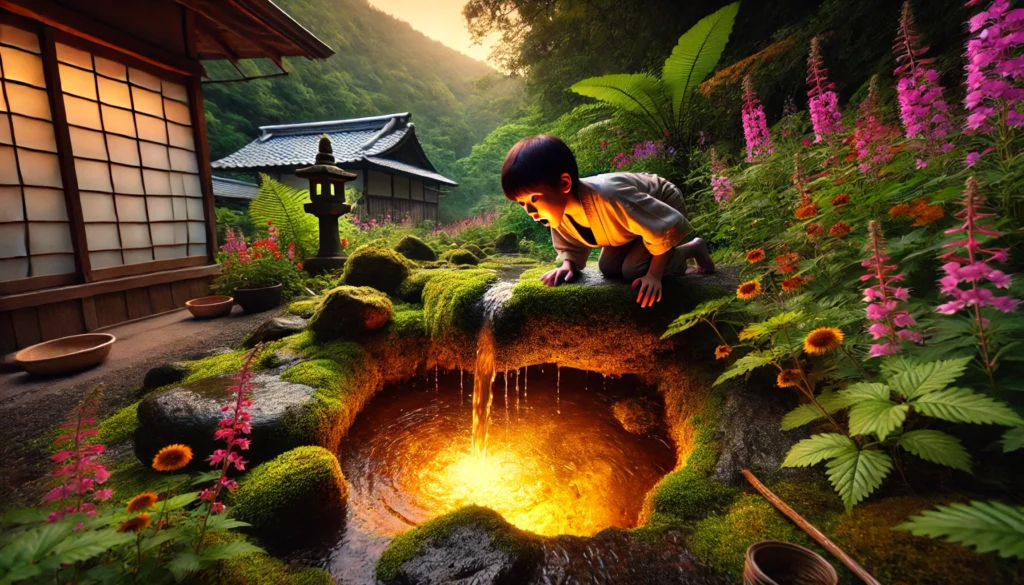In Japan, long ago names were more than just words—they carried the hopes and dreams of families. For first-born sons, names were grand and poetic, a symbol of honor and pride. Kojiro-no-Takara-Hikari-Mizuho, meaning “Treasure of Light and Abundance,” was one such name, given to a boy whose calm and proud demeanor matched its grandeur. His younger brother, however, was simply called Kintaro, or “Golden Boy.” Kintaro didn’t mind his simple name; he was full of energy and curiosity, always ready for an adventure.
One summer day, their grandmother, a wise woman with years of stories behind her eyes, gave them a stern warning. “Do not play near the sacred spring,” she said. “The waters are deep, and the spirits there do not forgive carelessness.” The boys nodded, but the spring’s glowing waters and the soft moss around its edges were too tempting to resist.
As they played near the forbidden place, Kintaro leaned too far over the edge, trying to catch a dragonfly. With a splash, he fell into the cold water. His cries echoed as he struggled to keep hold of a mossy rock. “Hold on, Kintaro!” shouted Kojiro, running as fast as his geta would allow.
He reached their grandmother’s house, shouting, “Kintaro has fallen into the spring!” Without a moment’s hesitation, she grabbed a rope and followed Kojiro back. The grandmother threw the rope into the water, her hands steady despite her age. “Grab hold!” she called, pulling Kintaro to safety. He climbed out, shivering and pale but unharmed. The grandmother scolded them, though her relief softened her words. “Do you now understand why I warned you?” she asked. The boys promised to be careful, but their curiosity was not so easily tamed.
A few weeks later, the brothers found themselves near the spring once more. This time, it was Kojiro who misstepped, slipping on the mossy rocks and falling into the water.
Kintaro, filled with panic, sprinted back to their grandmother. “Grandmother! Kojiro-no-Takara-Hikari-Mizuho has fallen into the spring!” he shouted. But he was out of breath, and his words tumbled together, making it hard for her to understand.
“Speak clearly,” she said, frowning. “A name must be spoken with respect.”
Kintaro tried again, but his lungs burned from running. Each time he repeated the name, his urgency grew, and tears welled in his eyes. Finally, the grandmother understood and rushed to grab the rope. By the time they returned to the spring, Kojiro had grown weak from the cold. Though they pulled him out, it took days for him to recover by the warm hearth of their home.
As Kojiro rested, wrapped in a thick blanket, the grandmother shook her head. “Such a grand name for such a silly boy,” she said, her tone kind but teasing. “But a name that is too long can cause more harm than good.”
The villagers, hearing of the incident, took her words to heart. From that day forward, they chose shorter, simpler names for their children, believing that practicality often carried wisdom.
Kojiro and Kintaro learned their lesson, but the memory of their adventures by the sacred spring stayed with them, a story passed down through generations in the village, where names and wisdom both held their rightful place.
小次郎と金太郎

こじろうときんたろうのものがたり
むかしむかし、しずかなやまのむらに、なまえがことばいじょうのいみをもつせかいがありました。なまえはかぞくのねがいとゆめをこめたたいせつなものです。ちょうなんには、ほこりときどりをあらわすながくすばらしいなまえがあたえられました。たとえば、こじろうのたからひかりみずほというような、いみのふかいなまえです。そのこじろうは、しずかでじまんげなせいかくをもっていて、なまえにぴったりでした。そのいもうとは、もっとかんたんななまえ、きんたろう、つまり「おうごんのこ」とよばれました。きんたろうはじぶんのなまえをきにせず、いつもげんきいっぱいで、ぼうけんずきのしょうねんでした。
あるなつのひ、おばあさん、ながいけいけんをもつかしこいひとが、ふたりにきびしくちゅういしました。「せいすいのいずみにちかづいてあそんではいけません。そのみずはふかく、そこにすむれいはゆだんをゆるしません。」ふたりはうなずきましたが、かがやくいずみとやわらかいこけのふちどりはあまりにもさそいがたかったのです。
ふたりがいましめられたばしょであそんでいると、きんたろうはとんぼをつかまえようとして、ふちによりすぎてしまいました。どぼんというおととともに、つめたいみずにおちました。「たすけて!」とさけびながら、こけのついたいわにしがみつきました。「しっかりして、きんたろう!」とこじろうはさけびながら、げたをならしてはしりました。
こじろうはおばあさんのいえにかけつけ、「きんたろうがいずみにおちました!」とさけびました。おばあさんはためらうことなくなわをつかみ、こじろうとともにいずみへむかいました。おばあさんはなわをみずにむけてなげました。「つかまりなさい!」とさけび、きんたろうをひきあげました。びしょぬれでふるえていたきんたろうをすくいあげ、おばあさんはあんしんしましたが、きびしいくちょうでいいました。「これでなぜちゅういしたかわかりましたね。」ふたりはきをつけるとやくそくしましたが、ふしぎへのこうきしんはそうかんたんにおさえられるものではありませんでした。
それからすうしゅうかんご、ふたりはふたたびいずみのそばにたちました。こんどはこじろうがすべり、こけのついたいわからみずのなかへおちました。
きんたろうはあわてておばあさんのもとへはしりました。「おばあさん!こじろうのたからひかりみずほがいずみにおちました!」とさけびました。しかし、いきをきらし、ことばがごちゃごちゃになってしまい、おばあさんはなかなかりかいできませんでした。
「はっきりいいなさい。」とおばあさんはしかめつらをしながらいいました。「なまえはけいいをもっていわなければいけません。」
きんたろうはくりかえしましたが、はしりすぎてむねがくるしく、なかなかうまくいえませんでした。なんどもなんどもいおうとし、なみだをうかべるほどいっしょうけんめいでした。さいごにおばあさんはりかいし、すぐになわをつかみました。ふたりがいずみについたとき、こじろうはさむさとつかれでよわっていました。なんとかひきあげましたが、げんきになるにはなんにちもかかりました。
こじろうはふとんにくるまれてやすんでいました。おばあさんはほのおのあかりでそのすがたをみて、やさしくちょっとからかうようにいいました。「こんなすばらしいなまえなのに、なんとまぬけなぼうやでしょう。」
むらのひとたちはこのできごとをきいて、おばあさんのことばをしんけんにうけとめました。それからというもの、こどもたちにはもっとみじかく、かんたんななまえがあたえられるようになりました。じつようてきであることがときにはちえであるとしんじたのです。
こじろうときんたろうはじぶんたちのまちがいからまなんだことをわすれませんでした。いずみのそばでのできごとは、むらのなかでだいじにかたられ、なまえとかしこさのたいせつさがかたられるおはなしとなったのです。


Leave a Reply